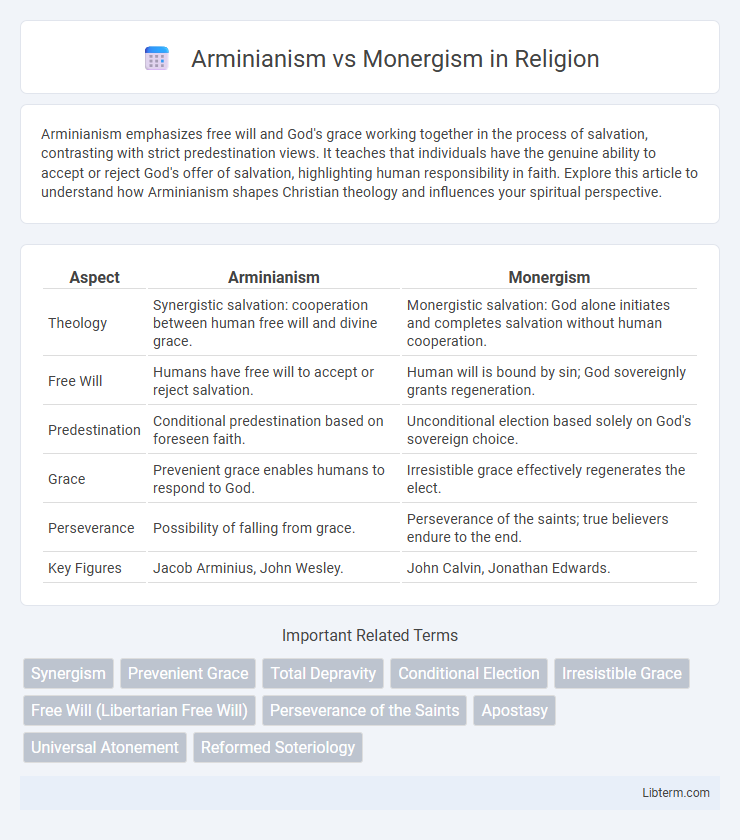Arminianism emphasizes free will and God's grace working together in the process of salvation, contrasting with strict predestination views. It teaches that individuals have the genuine ability to accept or reject God's offer of salvation, highlighting human responsibility in faith. Explore this article to understand how Arminianism shapes Christian theology and influences your spiritual perspective.
Table of Comparison
| Aspect | Arminianism | Monergism |
|---|---|---|
| Theology | Synergistic salvation: cooperation between human free will and divine grace. | Monergistic salvation: God alone initiates and completes salvation without human cooperation. |
| Free Will | Humans have free will to accept or reject salvation. | Human will is bound by sin; God sovereignly grants regeneration. |
| Predestination | Conditional predestination based on foreseen faith. | Unconditional election based solely on God's sovereign choice. |
| Grace | Prevenient grace enables humans to respond to God. | Irresistible grace effectively regenerates the elect. |
| Perseverance | Possibility of falling from grace. | Perseverance of the saints; true believers endure to the end. |
| Key Figures | Jacob Arminius, John Wesley. | John Calvin, Jonathan Edwards. |
Understanding Arminianism: Key Beliefs
Arminianism emphasizes free will in salvation, asserting that God's grace enables humans to choose or reject faith, contrasting with Monergism's belief in divine election and irresistible grace. Key beliefs include conditional election based on foreseen faith, universal atonement through Christ's sacrifice for all people, and the possibility of falling from grace. This theological framework highlights human responsibility and the synergistic cooperation between divine grace and human response.
The Core Principles of Monergism
Monergism emphasizes God's sole sovereignty in the process of salvation, asserting that regeneration and faith are entirely the work of the Holy Spirit without human cooperation. It upholds the doctrine of irresistible grace, meaning that those whom God chooses cannot resist His call to salvation. This theological perspective contrasts with Arminianism by denying free will in the initial act of salvation and emphasizing total depravity and unconditional election.
Historical Origins: From Reformation to Debate
Arminianism originated in the early 17th century as Jacobus Arminius challenged Calvinist predestination during the Dutch Reformation, advocating conditional election based on faith. Monergism, rooted in Augustinian and Reformation theology, emphasizes God's sole sovereignty and irresistible grace in salvation without human cooperation. The theological debate formalized during the Synod of Dort (1618-1619), where Arminian positions were officially rejected in favor of Calvinist monergism, shaping Protestant doctrinal divisions.
Free Will in Arminianism: Human Choice Explained
Arminianism asserts that human free will plays a crucial role in salvation, emphasizing that individuals can choose to accept or reject God's grace. This theological perspective opposes Monergism, which teaches that salvation is solely the work of God's sovereign will without human cooperation. In Arminianism, free will enables moral responsibility and genuine love, allowing humans to respond to divine grace through conscious decision-making.
Divine Sovereignty in Monergism: God's Role in Salvation
Monergism emphasizes divine sovereignty by asserting that God alone initiates and completes the work of salvation without human cooperation, highlighting the total depravity of humanity and the necessity of divine grace for regeneration. In this view, God's electing grace irresistibly brings sinners to faith, ensuring redemption solely through God's sovereign will and power. This contrasts with Arminianism, which allows for human free will in accepting or rejecting God's offer of salvation.
Predestination: Contrasting Perspectives
Arminianism emphasizes conditional predestination based on God's foreknowledge of human free will decisions, asserting that salvation is available to all who choose to believe. Monergism presents predestination as unconditional, where God unilaterally elects individuals for salvation independent of any human action or merit. This fundamental difference highlights Arminianism's emphasis on human agency versus Monergism's focus on divine sovereignty in the salvation process.
Grace: Resistible vs. Irresistible
Arminianism teaches that grace is resistible, meaning individuals can reject God's offer of salvation through free will, emphasizing human responsibility in accepting grace. Monergism asserts that grace is irresistible, where God's sovereign will ensures that the elect cannot deny or resist the call to salvation, highlighting divine determinism. This theological contrast centers on how grace operates in the process of regeneration and faith.
Assurance of Salvation: Security or Perseverance?
Arminianism emphasizes conditional security, teaching that believers can fall from grace and lose salvation if they turn away from faith, highlighting perseverance through continued belief as essential for assurance. Monergism asserts the doctrine of eternal security, based on God's sovereign election and irresistible grace, ensuring that true believers will persevere unfailingly until the end. The theological tension centers on whether assurance of salvation depends on human faithfulness or divine sovereignty, affecting soteriological perspectives on security and perseverance.
Practical Implications for Christian Living
Arminianism emphasizes human free will in accepting salvation, encouraging believers to actively pursue holiness, repentance, and cooperation with God's grace in daily life. Monergism highlights God's sole work in salvation, fostering reliance on divine sovereignty and assurance that spiritual growth results from God's unmerited grace rather than human effort. Both frameworks influence prayer, evangelism, and perseverance by shaping how Christians understand their role in sanctification and God's sustaining power.
Continuing Relevance: Arminianism and Monergism Today
Arminianism continues to influence contemporary theological discussions by emphasizing human free will and conditional election, impacting modern evangelical and Wesleyan traditions. Monergism remains central in Reformed theology, stressing God's sovereign grace as the sole agent in salvation, which sustains its relevance within Calvinist denominations. Both frameworks shape ongoing debates on divine sovereignty, human responsibility, and soteriological doctrine in 21st-century Christian thought.
Arminianism Infographic

 libterm.com
libterm.com